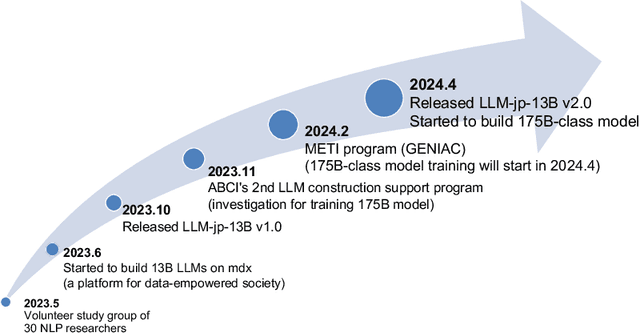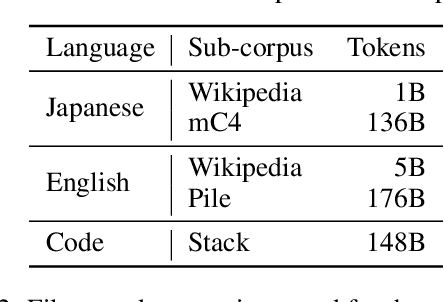Takumi Okamoto
Optimal Sparsity of Mixture-of-Experts Language Models for Reasoning Tasks
Aug 26, 2025Abstract:Empirical scaling laws have driven the evolution of large language models (LLMs), yet their coefficients shift whenever the model architecture or data pipeline changes. Mixture-of-Experts (MoE) models, now standard in state-of-the-art systems, introduce a new sparsity dimension that current dense-model frontiers overlook. We investigate how MoE sparsity influences two distinct capability regimes: memorization and reasoning. We train families of MoE Transformers that systematically vary total parameters, active parameters, and top-$k$ routing while holding the compute budget fixed. For every model we record pre-training loss, downstream task loss, and task accuracy, allowing us to separate the train-test generalization gap from the loss-accuracy gap. Memorization benchmarks improve monotonically with total parameters, mirroring training loss. By contrast, reasoning performance saturates and can even regress despite continued gains in both total parameters and training loss. Altering top-$k$ alone has little effect when active parameters are constant, and classic hyperparameters such as learning rate and initialization modulate the generalization gap in the same direction as sparsity. Neither post-training reinforcement learning (GRPO) nor extra test-time compute rescues the reasoning deficit of overly sparse models. Our model checkpoints, code and logs are open-source at https://github.com/rioyokotalab/optimal-sparsity.
Rewriting Pre-Training Data Boosts LLM Performance in Math and Code
May 05, 2025Abstract:The performance of large language models (LLMs) in program synthesis and mathematical reasoning is fundamentally limited by the quality of their pre-training corpora. We introduce two openly licensed datasets, released under the Llama 3.3 Community License, that significantly enhance LLM performance by systematically rewriting public data. SwallowCode (approximately 16.1 billion tokens) refines Python snippets from The-Stack-v2 through a novel four-stage pipeline: syntax validation, pylint-based style filtering, and a two-stage LLM rewriting process that enforces style conformity and transforms snippets into self-contained, algorithmically efficient examples. Unlike prior methods that rely on exclusionary filtering or limited transformations, our transform-and-retain approach upgrades low-quality code, maximizing data utility. SwallowMath (approximately 2.3 billion tokens) enhances Finemath-4+ by removing boilerplate, restoring context, and reformatting solutions into concise, step-by-step explanations. Within a fixed 50 billion token training budget, continual pre-training of Llama-3.1-8B with SwallowCode boosts pass@1 by +17.0 on HumanEval and +17.7 on HumanEval+ compared to Stack-Edu, surpassing the baseline model's code generation capabilities. Similarly, substituting SwallowMath yields +12.4 accuracy on GSM8K and +7.6 on MATH. Ablation studies confirm that each pipeline stage contributes incrementally, with rewriting delivering the largest gains. All datasets, prompts, and checkpoints are publicly available, enabling reproducible research and advancing LLM pre-training for specialized domains.
Building Instruction-Tuning Datasets from Human-Written Instructions with Open-Weight Large Language Models
Mar 31, 2025Abstract:Instruction tuning is crucial for enabling Large Language Models (LLMs) to solve real-world tasks. Prior work has shown the effectiveness of instruction-tuning data synthesized solely from LLMs, raising a fundamental question: Do we still need human-originated signals for instruction tuning? This work answers the question affirmatively: we build state-of-the-art instruction-tuning datasets sourced from human-written instructions, by simply pairing them with LLM-generated responses. LLMs fine-tuned on our datasets consistently outperform those fine-tuned on existing ones. Our data construction approach can be easily adapted to other languages; we build datasets for Japanese and confirm that LLMs tuned with our data reach state-of-the-art performance. Analyses suggest that instruction-tuning in a new language allows LLMs to follow instructions, while the tuned models exhibit a notable lack of culture-specific knowledge in that language. The datasets and fine-tuned models will be publicly available. Our datasets, synthesized with open-weight LLMs, are openly distributed under permissive licenses, allowing for diverse use cases.
Why We Build Local Large Language Models: An Observational Analysis from 35 Japanese and Multilingual LLMs
Dec 19, 2024



Abstract:Why do we build local large language models (LLMs)? What should a local LLM learn from the target language? Which abilities can be transferred from other languages? Do language-specific scaling laws exist? To explore these research questions, we evaluated 35 Japanese, English, and multilingual LLMs on 19 evaluation benchmarks for Japanese and English, taking Japanese as a local language. Adopting an observational approach, we analyzed correlations of benchmark scores, and conducted principal component analysis (PCA) on the scores to derive \textit{ability factors} of local LLMs. We found that training on English text can improve the scores of academic subjects in Japanese (JMMLU). In addition, it is unnecessary to specifically train on Japanese text to enhance abilities for solving Japanese code generation, arithmetic reasoning, commonsense, and reading comprehension tasks. In contrast, training on Japanese text could improve question-answering tasks about Japanese knowledge and English-Japanese translation, which indicates that abilities for solving these two tasks can be regarded as \textit{Japanese abilities} for LLMs. Furthermore, we confirmed that the Japanese abilities scale with the computational budget for Japanese text.
LLM-jp: A Cross-organizational Project for the Research and Development of Fully Open Japanese LLMs
Jul 04, 2024



Abstract:This paper introduces LLM-jp, a cross-organizational project for the research and development of Japanese large language models (LLMs). LLM-jp aims to develop open-source and strong Japanese LLMs, and as of this writing, more than 1,500 participants from academia and industry are working together for this purpose. This paper presents the background of the establishment of LLM-jp, summaries of its activities, and technical reports on the LLMs developed by LLM-jp. For the latest activities, visit https://llm-jp.nii.ac.jp/en/.
 Add to Chrome
Add to Chrome Add to Firefox
Add to Firefox Add to Edge
Add to Edge